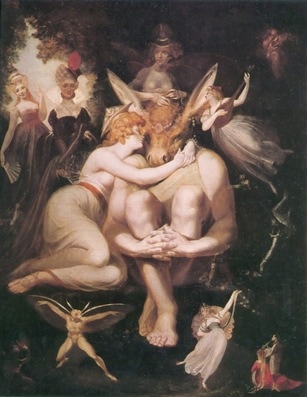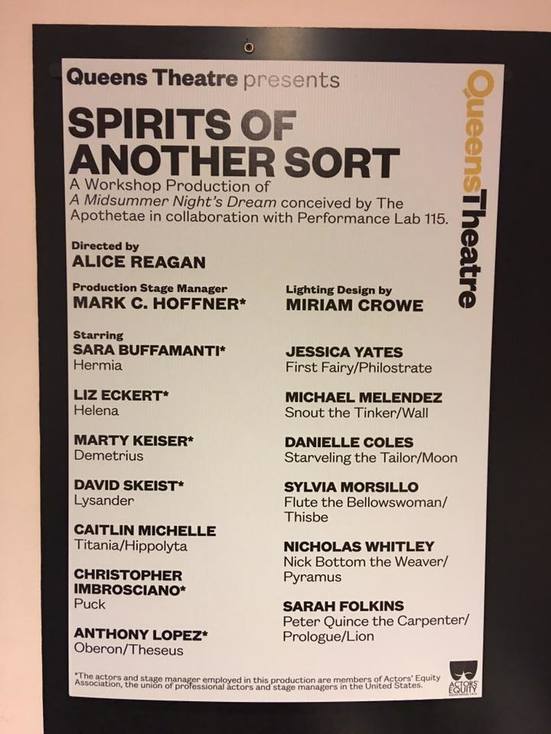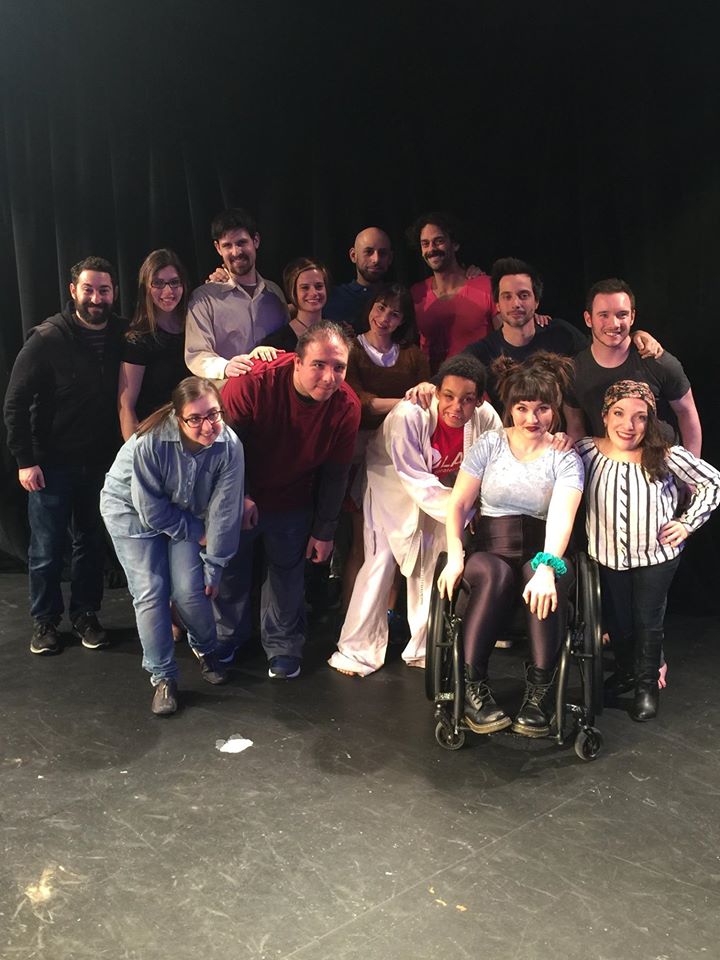
Our particular version of William Shakespeare's, A Midsummer Night’s Dream started as a theatrical experiment with the question: "What happens when three disparate communities collaborate together to work on one of Shakespeare's most beloved plays?" It has now become a serious investigation and manifestation of what is possible in the Theatre.
With this production we had a foundation and the benefit of a successful production behind us. With only two weeks of rehearsal, it would be difficult to go that much more in depth into what we presented originally in August 2014. What we could do, was have a more robust conversation about the ideas we were toying with (War, Chaos, Otherness) and enrich the sense of company amongst the integrated ensemble of physically disabled, intellectually disabled and non-disabled actors.
One thing we wanted to be sure to adjust this time around was having the entire ensemble present at the first rehearsal. Previously, we had worked with the Rude Mechanicals separately, before the integration of the full cast, and this caused some issues when everyone came together.
The first read-thru went well, and there was an overall sense that we were picking up right where we left off. The Rude Mechanicals seemed comfortable in their roles. The only thing that stood out was the need to get Mikey Lorch, our new Snug/Lion up to speed. This soon resolved itself. For various reasons Mikey was unable to ensure his participation at the rehearsals he was called for. Furthermore, he could not absolutely guarantee his attendance at all of the performances. Since this was a contracted, professional gig with pay attendance at rehearsals and performances was a minimum requirement. The mutual decision was made to proceed without him. Sarah Folkins (Peter Quince) stepped in to cover- forgive the pun- "the Lion’s share of the work.”
One of this biggest lessons learned working with the Rude Mechanicals was to not look for the performance that we, the "professional actors," desired from them or assumed they should be giving, Rather, we needed to allow them the time to make the work their own. We were trying to strike the delicate balance that would give them agency and ownership over their own process and characters, that at the same time, fulfilled the demands of performance.
Since Christopher Imbrosciano was cast to play Puck/Egeus this time around, I was free to focus on the work of producing and could devote any necessary time to the Rude Mechanicals. By the end of that first week however, I felt that the actors were a bit locked in to the directions that Alice and I had given them. They weren't bringing what was unique about them as individuals to their roles. One rehearsal, as Alice was working with the Lovers I had roughly ninety minutes to work with the Rude Mechs. I wanted to shake things up.
I told the actors that Alice and I were in leadership roles, and while we had ideas, we didn't have all the answers. They were allowed to contribute their own thoughts and ideas on their characters, staging, etc. Additionaly, everyone was cast because of exactly who they were as a person- physically, intellectually, neurologically. Playing these particular characters was an opportunity to allow their full humanity (which includes their disability) to come through. Prior to the start of rehearsal that day in a conversation with Michael Melendez, I learned that he really liked to sing. As an exercise, we turned the play within a play into a musical. I asked each actor to deliver their lines sung in their favorite genre or style of music. We had everything from Country to Opera, Hip-Hop and Funk flying through the air. I allowed the actors to ad-lib between lines and entrances and exits. Things started to immediately come alive. Problems with remembering text began to fade away as each character began to appear with different colors and possibilities that hadn't been seen before. It was only an exercise, but everything seemed to make sense. One stand-out example: Nicholas Whitley, our Bottom, who identifies as having a "learning disability," refused to commit with the singing and wanted to act it as he had originally prepared. That's so, Bottom.
As we returned to the rehearsal room to do a run, I huddled up with the Rude Mechs and told them to perform the play as we had rehearsed. Nick asked if he had to sing, and I told him he could do whatever he felt the character would want to do. Their performance took the Lovers/courtiers completely by surprise and real moments were happening in the rehearsal room. For the next two rehearsals our Snout/Wall, Michael Melendez, sang all his lines. We eventually asked him to tone that down. Moving forward he never had any issues delivering his text.
This could happen with any group of actors.
There were issues with showing up on time, food and snacks in the rehearsal room, cell phones going off, etc. The need for conversations about how to conduct ones self in a professional environment happened more often than I would have liked. Overall, the Rude Mechanicals demeanor and integration into the larger ensemble and process was far easier and more successful with this second iteration.
When we have the good fortune to work on this project again, I would like to give The Rude Mechanicals full creative control over the play within the play.
Our Oberon and Titania were played by two actors with limb loss, Tony Lopez and Caitlin Michelle. Our Puck and First Fairy were played by actors who have cerebral palsy, Chris Imbrosciano and Jessy Yates. Visually, the physical diversity is stunning: Tony has a prosthetic leg, Caitlin a prosthetic arm; one molded plastic and one bionic. Jessy is ambulatory but chooses to use a wheelchair for increased mobility, and Chris has a very particular gait and carriage.
Knowing a little something about CP myself, as an actor I am constantly working and moving through incredible amounts of tension; a result of the neurological effects on the body related to spastic diplegia. Only until very recently have I begun to acknowledge the fact that every character I ever play will have my disability. It is completely antithetical to "good acting" to deny the vessel with which one was born into. This is the instrument through which one accesses sound, breath, emotions and, you know, everything that makes a person human.
Jessy, a recent graduate of NYU doubled as First Fairy and Philostrate. She told me in conversation that since deciding to use a wheelchair she noted a marked improvement in her acting. This made sense to both of us. When your nervous system isn't in a constant state of fight or flight trying to maintain balance, resist the force of gravity and not fall or crash into people or objects one can focus more on things like- being present in the scene at hand.
With Chris, I noticed he always appeared to be rushing to make his entrances and exits. Even when he was encouraged to take his time, by Alice and myself, he didn't seem able to slow down. Chris would often fall down in his scenes. This is completely related to CP in particular, which thrives on speed and momentum in an effort to maintain balance and stability. Throughout the process I encouraged him to acknowledge his CP and integrate it into the character. Puck is non-human and supernatural, so there was no need for Chris (or any of the Fairies) to try and "appear normal." We also worked one on one on identifying and accessing specific initiation points in the body through which Puck would move and cover space. Chris in particular rarely bends his knees and there's no movement in his shoulder blades when he's in motion. We experimented with Puck initiating movement from the shoulder blades and the back of the knees. Stillness was also a problem for Chris. For a CP nervous system the fear of falling is very real and the system is constantly reminding the body of that fact. We gave him (Chris/Puck) permission to always be in motion- small, medium, big, internally, externally, etc. After all Puck is mercurial; a famous shape shifter who even brags about his speed on more than one occasion. We felt we had a contextual justification for this, that might also offer Chris some relief and a new way into exploring the character.
All of this was easier said then done, and we had varying degrees of success. I think what's important to note is that we were aware and acknowledged Chris' particular idiosynchracies as an actor and were making the attempt of actively strategizing solutions to enhance his character and performance.
Caitlin Michelle is a seventh grade Language Arts teacher who lives and works in New Jersey. While she has acted before (most recently as Athena is CSC's production of Iphegnia last season), I knew her experience with classical text was limited.
This is an interesting position to be in as an artistic director who works primarily with Disabled artists. I want to elevate the quality of work in this area in an effort to merge Disability in to the mainstream. Personally, that means increasing visibility and opportunity by giving disabled actors and artists opportunities to work with people and material they wouldn't necessarily have access to. I am keenly aware that the levels of talent, training and experience vary greatly in the community of Disabled actors I currently know. My goal is always the creation of first rate theatre. At this stage I am constantly balancing the demands of creating "good work" and the need to develop the skills and talents of Disabled artists.
With Caitlin, she already possessed a great love of language and had a strong intellectual grasp of the character and given circumstances. Sara Buffamanti, an Artistic Advisor to The Apothetae who also played Hermia in both versions, worked with Caitlin one-one-one. With a few simple tools Caitlin was able to adjust her breath, vocalization and made the imagery in the text come alive. She even continued the work outside the rehearsal room and mentioned that her students noticed a marked difference in her voice.
Putting It All Together:
I was thrilled to have our original foursome of lovers return. Their combined talent and expertise, common vocabulary based on their shared experience at Columbia's MFA Acting program and their willingness to dive into a project with more questions than answers and give their all is a rare gift.
One question that kept coming up for some of us was, who cares about the Lovers? They have an extraordinary experience during the course of the play that should leave them changed in some way, yet they remain for the most part narcissistic, vain and petty to the end.
I didn't want this cast to engage in this process, have a shared experience, and feel like nothing had been learned or exchanged about an experience that was different from their own. The Apothetae is not a community organization or engaging in art therapy. A major pillar of the company's mission however, is to expand the conversation and discourse on Disability in Theatre and by extension, society at large. We were able to do some of this thanks in no small part to Jan Valle
Jan joined us last time, but was out of town during our performances at Ensemble Studio Theatre. This time she was present at practically every rehearsal and performance for our run in Queens. As artistic director of The Apothetae, I feel the documentation of all our work is essential. With "Spirits Of Another Sort" in particular, there were no existing models for the kind of work we were engaging in. When Jan volunteered to capture our process through her unique perspective as educator, scholar and ally in the field of Disability Studies I didn't hesitate. We both saw this as a great opportunity and have a shared hope that our work will be published and replicated for future study and application.
In between our matinee and evening performance on Saturday, each member of of the ensemble was invited to participate in a conversation about being part of this process. We had a frank, open discussion about Theatre, Disability and Community. Not everything can be solved with one conversation, but change can certainly begin with one. "Spirits Of Another Sorts' " greatest successes was the people it brought together. All of the elements insured our experiment's success.
I think there's some special alchemy to the ethnic, gender, physical and neurodiversity in our ensemble embodying Shakespeare's text. That alchemy works when shared with an audience, whether it be in performance or talk-backs. Perhaps it grows stronger in conversations amongst the cast and crew in the green room and maybe, just maybe, it starts working as soon as these particular bodies enter an arts center or organization like Queens Theatre. The space changes. Eyes and ears are broken open. Change happens. That is a kind of simple magic that only theatre can work. The best kind.


 RSS Feed
RSS Feed